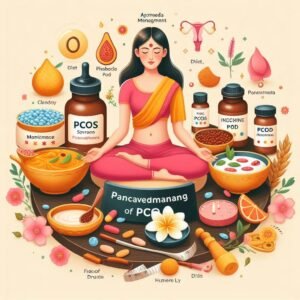Understanding Hair Fall: Causes and Ayurvedic Perspective
Hair fall is a common concern affecting people of all ages. While shedding a few strands daily is natural, excessive hair loss requires special attention. Ayurveda offers a holistic approach to hair fall treatment by addressing its root causes rather than just the symptoms.
Common Causes of Hair Fall
- Hormonal Imbalances & Medical Conditions: Pregnancy, menopause, thyroid disorders, and alopecia can lead to hair thinning.
- Genetics (Androgenic Alopecia): Hereditary hair loss, resulting in male-pattern baldness or female-pattern thinning.
- Hairstyles & Chemical Treatments: Tight hairstyles, heat treatments, and chemical exposure damage hair roots.
- Physical & Emotional Stress: Trauma, illness, or chronic stress disrupts the hair growth cycle.
- Nutritional Deficiencies: Lack of iron, protein, and vitamins weakens hair roots, causing hair fall.
Ayurvedic View on Hair Fall
In Ayurveda, hair fall is known as Khalitya and is classified under Shiro Roga (scalp disorders). It is primarily a Pitta-predominant Tridoshaj Vyadhi, meaning an imbalance of Vata, Pitta, and Kapha doshas leads to hair fall:
- Vataja Khalitya: Dry scalp, rough texture, hair breakage.
- Pittaja Khalitya: Red, inflamed scalp with visible veins.
- Kaphaja Khalitya: Oily, sticky scalp causing clogged follicles.
- Sannipataja Khalitya: Combination of all symptoms with severe hair loss.
Ayurvedic Hair Care Tips for Hair Growth & Hair Fall Control
1. Ayurvedic Diet for Hair Growth
- Pitta-Pacifying Foods: Include cucumbers, leafy greens, and sweet fruits.
- Iron-Rich Foods: Spinach, beets, and pomegranates.
- Protein Sources: Lentils, nuts, seeds, and dairy.
- Hydration: Drink amla juice, coconut water, and herbal teas to detoxify.
2. Ayurvedic Lifestyle Practices
- Manage Stress: Engage in Yoga, Pranayama, and Meditation.
- Get Proper Sleep: Essential for scalp cell repair and hair strength.
3. Best Ayurvedic Herbs for Hair Growth
- Bhringraj (Eclipta alba): The ‘King of Herbs’ for hair nourishment.
- Amla (Indian Gooseberry): Rich in Vitamin C, strengthens follicles.
- Brahmi (Bacopa monnieri): Improves scalp circulation and mental calmness.
- Neem: Fights dandruff and scalp infections.
- Hibiscus: Promotes regrowth and prevents premature greying.
4. Ayurvedic Oils for Hair Fall Control
- Bhringraj Oil: Boosts hair growth and reduces scalp inflammation.
- Amla Oil: Strengthens roots and prevents early greying.
- Neeli Oil: Deeply nourishes the scalp.
- Coconut Oil Infused with Herbs: Moisturizes and soothes the scalp.
- Application: Massage oils gently onto the scalp for improved blood circulation.
5. Ayurvedic Hair Masks & Home Remedies
- Amla, Shikakai & Reetha Mask: Detoxifies and strengthens scalp.
- Fenugreek (Methi) & Yogurt Pack: Provides deep nourishment.
- Aloe Vera & Hibiscus Paste: Cools the scalp and promotes growth.
6. Ayurvedic Therapies for Hair Fall Control at Adyant Ayurveda
- Shirodhara: Medicated oil therapy to reduce stress-induced hair fall.
- Shiro Abhyanga: Herbal head massage for hair root nourishment.
- Nasya Therapy: Nasal oil application to balance Vata dosha.
- Panchakarma Detox: Treatments like Virechana (purgation) and Basti (colon cleansing) to eliminate toxins and enhance hair regrowth.
7. Preventive Measures for Hair Fall
- Avoid excessive heat-styling tools and chemical hair treatments.
- Use mild, herbal shampoos instead of sulfate-based products.
- Protect hair from excessive sun exposure and pollution.
Why Choose Adyant Ayurveda for Hair Fall Treatment?
At Adyant Ayurveda, we provide personalized Ayurvedic treatment plans based on your dosha balance and root causes of hair fall. Our holistic approach includes:
- Herbal formulations for internal and external use.
- Ayurvedic therapies like Panchakarma for long-term hair health.
- Customized diet and lifestyle recommendations for hair regrowth.
Conclusion
Hair fall can be effectively managed by addressing the root cause with Ayurvedic principles. Following a balanced diet, healthy lifestyle habits, and incorporating Ayurvedic herbs and therapies can lead to stronger, healthier hair. For expert guidance, visit Adyant Ayurveda, the best Ayurvedic clinic in Bangalore, and take the first step towards optimal hair health.






